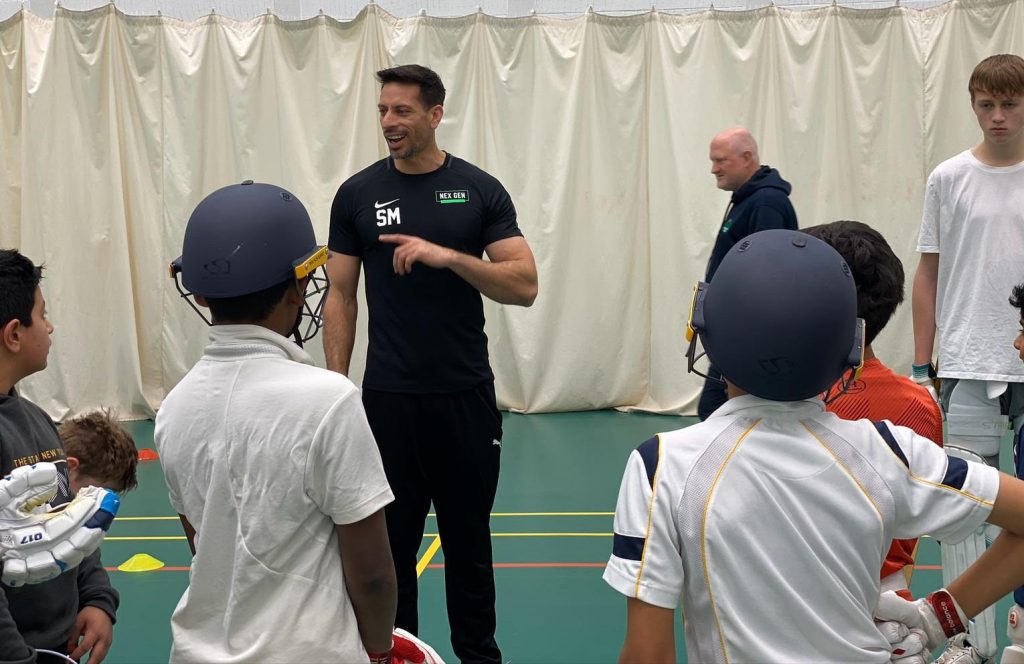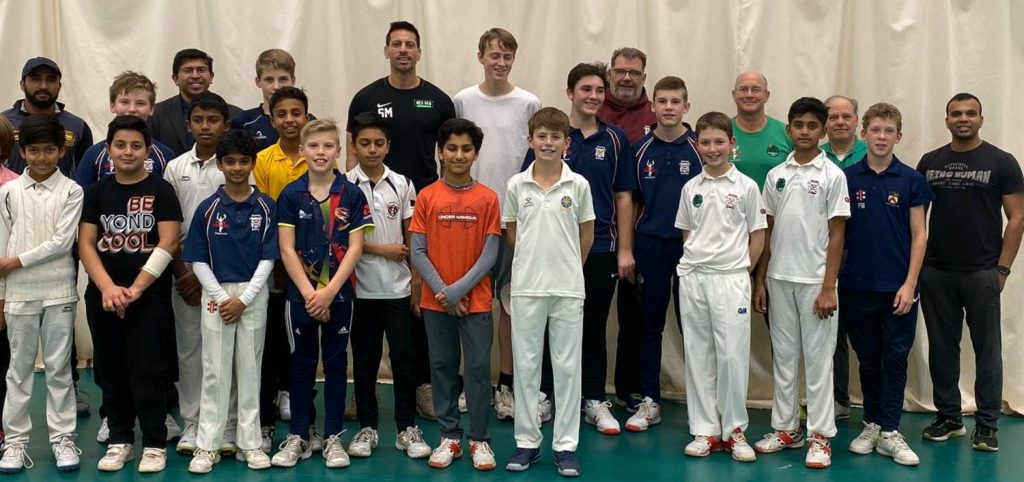From breaking Flintoff’s arm to batting for mental health awareness: Former England international Sajid Mahmood on life after cricket

As he stood in the corner of a crowded Jubilee Line car late on a Thursday evening, it looked like he was living a life in obscurity. Despite his 6ft-4 frame, he blended into the crowd like a common Londoner.
Little did anyone in that carriage know that their co-passenger was one of the most promising bowlers when he debuted for the England cricket team in 2004.
Sixteen years later, Sajid Mahmood leads a rather quiet life.
The 38-year-old, however, relishes the privacy he gets in London. “Everyone is busy here. So it is easier to lead a private life,” Sajid said, while the train chugged past the London Bridge station.
It is different in Manchester, the city where he’s been and brought up. “I grew up there. They recognise me if I go out like this,” he added, as he made himself comfortable by squeezing in between two people busy on their phones.
Sajid’s ferocious deliveries once frightened even his teammates who faced him in the nets. His cricket résumé included inadvertently breaking the arms of former England captain Andrew Flintoff and county teammate Alex Gidman during practice sessions.
Another victim of his nasty bouncers was Australian batsman Callum Ferguson who broke his nose in the Big Bash League.
Despite his pace and the freshness surrounding him during his debut, Sajid is not remembered as a player who has won many cricket hearts. Often referred as being ‘inconsistent and expensive’, Sajid also agrees to the stick he usually gets.
Difficulty in handling pressure and regret for not seeking psychological support
“Some of them look at my career and say I was inconsistent, which is true. I was.”
But the bowler reckons things would have been different had he gained more experience before debuting for England. Or if he received adequate psychological support to help deal with the pressure of playing at top level.
“Coming onto the scene early, it was like learning to swim at the deep end of a pool. It isn’t a bad thing. Because I felt it was good for me to expose myself at that age. I needed that experience to see where I was and where I needed to get really.
“At that age, the only thing I need to do was bowl quickly to be successful. But obviously you needed some plan. You had to bowl at certain areas. You had to bowl consistently. And that is something I learned later on in my career, which I should have really done earlier on.
“To be fair, we had psychologists up in place. And that was optional. I didn’t take it, while I should have done. If I had spent more time in county circuit before going international, I would have known a little bit more about my game. I would have played a lot more consistently for England.
Sajid said he was under immense pressure right from the beginning of his career.
“Even when I performed well, I did not know if I would play the next game. I was undergoing a lot of pressure.”
“That feeling came in my debut Test series against Sri Lanka. I did well in my first two matches at Lords and Edgbaston. And then I was told I might not play in Nottingham because they wanted to bring in a swing bowler. But I didn’t understand why should I be dropped because all the wickets I had picked up were from swinging. Since then, every time I played, I believed I might not play the next game even if I did well.”
Sajid believes he was too young to handle that pressure and is not surprised how some current cricketers take a break from the game to deal with the mental toll.
“I could have handled the stress better if I got psychology classes. Instead I put extra pressure on myself. If I had that in place, I think I would have played a lot more games.”
“They [current cricketers who take breaks] have a lot of pressure, and there’s a lot of money at stake. Every single move they make is scrutinised in the press. Hopefully, by getting adequate mental support earlier in their career, they will be in a better position when they get older.
“When you watch cricket, it looks easy like any sport. But you have to spend a lot of time away from the family. You have to make a lot of sacrifices. If you are playing for a long period of time away from home, it does take its toll. End of the day, you are human, no matter how strong you are in your mind. Having a set mindset helps you get through that. But there will be cases when you have to take a break to refresh yourself a little bit.”
On a mission to help young cricketers

Today, Sajid is trying to share what he did not get earlier in his career—mental guidance. He is head of cricket at a school in Greenford. He also helps out with MCC and coaches Middlesex girls. Besides, he attends cricket training camps offering special classes.
Sajid was at one of those masterclass in Kent County Cricket Club in Beckenham when Sports Gazette caught up with him.
When the Ace Cricket Coaching team invited him to coach their students for a day, Sajid happily accepted it, as he knows how important it is for the youngsters to get a precise outlook earlier in their careers.
Ace Cricket’s Govind Sankar, who invited Sajid to the camp, believes the students at his academy have a lot to learn from Sajid’s wealth of experience.
“We are extremely happy to have Sajid here. He gives a new perspective to the budding cricketers,” Sankar said.
Sajid also believes he focuses on changing the mindset when he coaches young cricketers.
“When I started bowling I just thought I need to bowl quick,” Sajid said.
“Because in county cricket, you get away with it. But when you play international cricket, you will get hit for a four even if you bowl above 90m/hour.”
“I didn’t get psychological help until very late in my career. Maybe 28-29. Something I wish I did when I was a lot younger. That’s why I speak a lot about that while coaching. Because it is important to get yourself back on track and avoid negative thoughts.
“If you go for trials, and you don’t get in, as a kid you can be let down quite a lot. And you start thinking if you can play this sport ever again. Am I actually good enough? But if you get into the mindset and start to think positively, and decided I’m gonna try harder. I think they will have a positive outlook on life as well, not just cricket.
“I like to talk about mindset a lot when I’m coaching. The more you can give them advice and the more you can give them quality coaching, I think it puts them in a decent position.
Growing up to become a cricketer
A third-generation immigrant from Pakistan, Sajid was born in a cricket-crazy family. His dad used to play local league cricket in Bolton.
“Every week, I used to go with him because I was quite an active kid. A lot of the time, they were short of players. So my dad used to ask me to field for his team. I never batted or bowled, but I still enjoyed it.”
He was just 10 years old, but young Sajid soon realised his hand-eye coordination was getting a lot better.
“I enjoyed the competition. And then I got into a local cricket club by the age of 14-15. Later I went for trials at Lancashire, but I didn’t get in.”
However, he was not a quitter. He went back again for trials at 17, but failed yet again.
“But that year one of their players got injured. So the coach rang my dad and asked if I can play. The coach said this would probably be the only game I could play. I went there and played well. And the following week, the player was still injured. So the coach asked me to play again. I batted and bowled well again and literally they couldn’t really leave me out of the side.”
Sajid went on to play the whole year.
“It was quite lucky the way I got in. And when I got my chances, I did quite well.”
Test debut at Lords and playing against Pakistan
For Sajid, cricket gave him everything. “Cricket made my parents be proud of me. It was really important for me.”
He said the game also taught him to break out of his shell and experience the world.
“[When I was a kid] We never went out and did stuff with people from different ethnicity. At England and Lancashire, majority of my teammates were whites. Just to get exposed to that environment, learn how to react, to integrate was huge.”
“You meet a lot of people from different backgrounds. It gives you so many life experiences. It educates you a lot. You make friends from different countries and different walks of life. It makes you a well-rounded person.”
But it’s the debut at Lords which stands apart as the biggest memory from his cricketing career.
“I had all my family there and I remember my first spell. I had never experienced anything like it before. The crowd was getting behind me. They were noisy. I loved that. I got three wickets in my first spell. That was a massive experience for me.”
Sajid also enjoyed playing against Pakistan in Test and ODI.
“Growing up, I watched Pakistan quite a lot because they were an exciting team. And my dad was a Pakistan fan as well. Then to play against them was big. Their crowd was quite passionate. I got a bit of barrage from them, which was an experience.
“There are not many people who can say they have played cricket for their country. Cricket basically made me who I am.”
Retirement and coaching role
Sajid never expected he would become a coach when he retired from playing.
“When I used to play, a lot of guys have asked me if I will ever get into coaching. I was never really a fan of it, to be honest.
“After retirement, I did nothing for two years. Because I felt like I had missed time with my family. And that allowed me to look at what I wanted to do next. We started a clothing business. We still have it. I did that to see my competitive side come out. Because what I was missing after retirement was the competitive side of everyday life. And when I look at cricket, the coaching side crept in. And then I fell in love with it.”